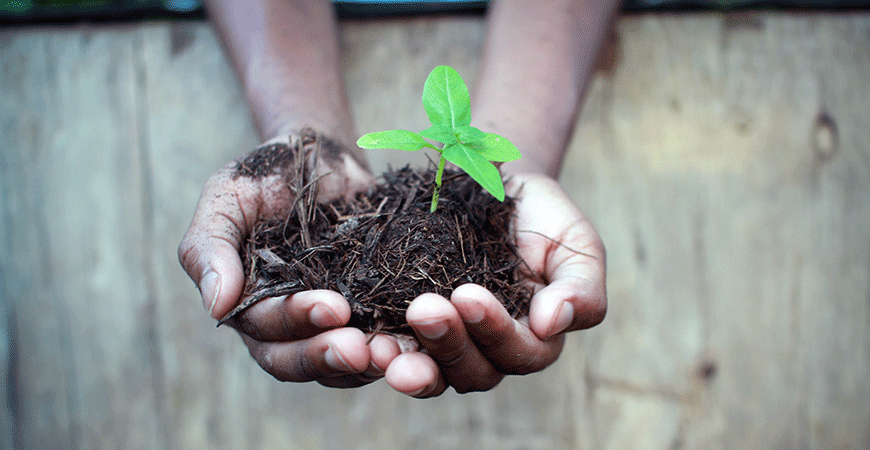
About 4.5 billion people around the globe do not have access to adequate sanitation, and what they do have — typically pit latrines and lagoons — are responsible for widespread illnesses and a portion of the greenhouse gases that are warming the planet.
UC Merced Professor Rebecca Ryals and a group of colleagues have a solution that not only increases safety, sustainability and jobs, but reduces greenhouse gas emissions and waste-borne illnesses while producing an effective fertilizer for agriculture.
The answer? Composting.
A new study published today in Nature Climate Change reveals surprising results from several years of testing in Haiti, a country with notoriously poor sanitation and one of the communities most vulnerable to climate change.
The study examined the amount of methane, nitrous oxide and carbon dioxide emitted during thermophilic composting of human waste and determined greenhouse gas emissions factors, or how much of the source material escapes into the atmosphere as greenhouse gases during the composting process. They compared emissions factors from composting to other non-sewer sanitation methods that are used around the world.
“Composting has a much smaller greenhouse gas footprint than all of the other non-sewer technologies that are used widely today,” Ryals said. “Off-site composting has a methane emissions factor of 0.5 percent, compared to 20 to 80 percent from pit latrines and lagoons. If this was scaled up to 1 billion people, it could mitigate between 13 and 44 percent of the global sanitation emissions.”
The sanitation sector contributes between 2 percent and 6 percent of the Earth’s methane emissions, and between 1 percent and 3 percent of the nitrous oxide emissions, Ryals explained. Both gases are found in relatively low concentrations in the atmosphere compared to carbon dioxide, the leading cause of climate warming, but are far more powerful. Methane alone accounts for more than 20 percent of current climate warming.
The research team includes Ryals, an agro-ecologist, and postdoctoral researcher Gavin McNicol, now at Stanford University, the first author on the paper.
The team worked with Sustainable Organic Integrated Livelihoods (SOIL) Haiti, a nonprofit that works to design, test and implement sustainable and cost-effective solutions to the country’s sanitation crisis.
In Haiti, only 30 percent of the population has access to sewered sanitation and less than 1 percent of the human waste there is safely treated. The lack of safe treatment has fueled one of the largest and most virulent cholera epidemics in recent global history, SOIL said.
But off-site composting is a full-cycle sanitation solution, from waste collection all the way through transformation and reuse. SOIL provides toilets and removes waste from communities, preventing the spread of waterborne diseases. The composting process purifies the waste, provides jobs for more people, increases safety, protects the ocean, lakes and rivers, produces compost that is sold for agriculture and reforestation, and mitigates climate change.
“The compost itself becomes a carbon sink,” Ryals said. “We’ve already shown that spreading compost on grasslands helps the plants take carbon dioxide out of the atmosphere and increases water retention, and it’s an amazing resource to restore depleted soils.”
McNicol, who was a postdoc in Ryals’ lab at University of Hawaii at Manoa, said innovative thinking is increasingly important because of the world’s dwindling resources and the increasing number of informal settlements around the globe.
“Providing safe, sustainable sanitation can improve public health and strengthen local economies. Fewer people getting sick means fewer days lost from work and an increase in productivity. However, sanitation innovations such as off-site composting can also provide new revenue sources for sanitation providers,” he said. “The compost can be sold to recover some of the cost of service provision. With this study, we’re showing a large amount of methane can be mitigated, then monetized as carbon offsets.”
Ryals, a member of the Sierra Nevada Research Institute who's in the Department of Life and Environmental Sciences in the School of Natural Sciences, and her colleagues have a number of ongoing projects with SOIL. They plan to continue testing and quantifying climate-change mitigation data and looking at ways to scale up off-site composting.
“It’s a real privilege to work with a pioneering group like SOIL,” Ryals said. “Human waste is not a topic people like to discuss, but everyone needs access to safe, dignified sanitation, and the world needs sustainable waste disposal and treatment solutions.”




